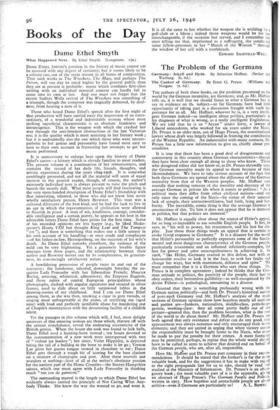Books of the Day
Dame Ethel Smyth
What Happened Next. By Ethel Smyth. (Longmans. 151.) DAME ETHEL SMYTH'S position in the history of music cannot yet be assessed with any degree of certainty; but it seems likely to be a solitary one, out of the main stream in all forms of composition. That such works as The Wreckers, The Mass, and perhaps The Prison, will one day be rated higher by the general public than they are at present is probable: music which combines first-class writing with an individual material content can hardly fail to come into its own at last. And one must not forget that the recent Sadlers Wells revival of The Wreckers was something of a triumph, though the composer was tragically debarred, by deaf- ness, from hearing a note of it.
Those who heard Dame Ethel's speech after the first night of that production will have carried away the impression of an extra- ordinary, of a wonderful and indomitable woman whose most striking superficial characteristic is an absolute frankness and intransigence. This is the weapon with which she crashed her way through the anti-feminist obstructions of the late Victorian era; it is the quality which is most arresting in her literary work ; but it is undoubtedly also the one which those who were unsym- pathetic to her genius and personality have found most easy to turn to their own account in frustrating her attempts to get her music performed.
It is unnecessary to enlarge here upon the history of Dame Ethel's career—a history which is already familiar to most readers. The present volume is a continuation of her reminiscences, and contains the record of her daily life, friends, thoughts, and artistic experience during the years 1894-1908. It is somewhat ramblingly presented, and not all the material will seem of equal interest to the general reader, though, of course, the author's extremely individual note is always present to raise the pitch and banish the merely dull. What most people will find fascinating is the very open-handed description of Dame Ethel's friendship with that interesting, talented, to those who did not know him never wholly satisfactory person, Henry Brewster. This man was a cultured dilettante of the best kind, and he had the luck to live in an age in which the representatives of civilisation were allowed to flourish in peace A man of wit, kindliness, courage, consider- able intelligence and a certain poetry, he appears at his best in the admirable letters Dame Ethel here prints for the first time. Some of his recorded opinions are less happy (e.g., he liked Shake- speare's Henry VIII but thought King Lear and The Tempest "rot "), and there is something that makes one a little uneasy in his own account of his handling—at once crude and complacent —of his father-in-law, Herzogenberg, on the occasion of his wife's death. As Dame Ethel remarks elsewhere, the violence of the mild can be very frightening. Yet a genuinely lovable figure emerges from these pages, and the relationship between their author and Brewster moves one by its completeness, its genuine- ness, its convincingly satisfactory nature.
A bewildering procession of people races in and out of the narrative: the handsome, talented, downright Smyths; the ex- quisite Lady Ponsonby with her Edwardian French; Maurice Baring, amusing, whimsical, admonitory; the Empress Eugenie, and those rulers of central European principalities whose photographs, slashed with angular signatures and secured in silver frames, used to slide about on little satinwood tables in the drawing-rooms of my childhood. And I can see Dame Ethel among them, as she was then, smoking a cigar in grey tweeds, or singing most unforgettably at the piano, or terrifying me (aged nine) with loud and perfectly justifiable abuse for murdering one of Chopin's masterpieces with the devastating facility of a childish talent.
Yet the passages in this volume which will, I feel, most delight amateurs of this amazing woman are those which, thrown off with the utmost nonchalance, reveal the endearing eccentricity of the British genius. When the house she took was found to lack bells, Dame Ethel used a hunting-horn instead ; ten hours devoted to the instrumentation of a new work were interspersed with two of "violent ice hockey "; her sister, Violet Hippisley, is depicted biting the tail of a bulldog to the bone to make it let go ; Vernon Lee gives her guests tongue stewed in chocolate to eat ; Dame Ethel gets through a tough bit of scoring for the bass clarinet on a mixture of champagne and port. After these marvels one wonders at nothing—least of all at the writer's obstinate passion for the nastiest part of the Home Counties—the Surrey-Hampshire sahara, which one must agree with Lady Ponsonby in thinking much "too ton de garnison."
The outstanding marvel is the length to which Dame Ethel has evidently always carried the principle of Not Caring What Any- body Thinks. She knew the way she wanted to go, and went it.
It is all the same to her whether the weapon she is wielding be a golf-club or a baton ; indeed those weapons would be for her interchangeable, if the occasion but served, and I remember her once telling me that, imprisoned as a suffragette, she condu,ted some fellow-prisoners in her "March of the Women" through the window of her cell with a toothbrush.
EDWARD SACKVTLLE-WES r.






























 Previous page
Previous page